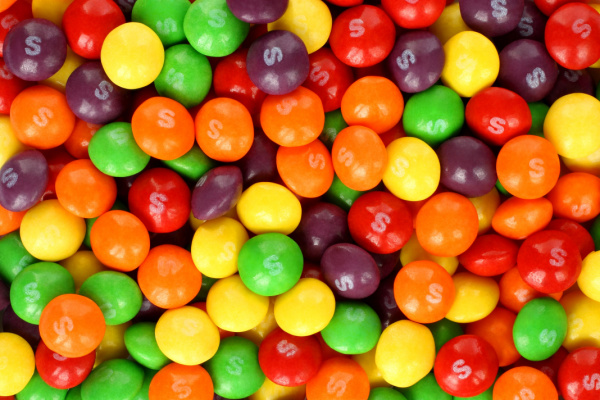Skittles will no longer be made with titanium dioxide, a color additive that has drawn scrutiny for potential health risks, the parent company of Skittles, Mars Wrigley, confirmed with multiple news outlets.
Under growing pressure from first the state of California and now the Department of Health and Human Services (HHS) led by anti-additive advocate Robert F. Kennedy Jr., Mars Wrigley said that it ceased using the color additive for Skittles sold in the United States at the end of last year.
What is Titanium Dioxide?
Titanium dioxide (TiO₂) is a naturally occurring metal oxide that is often processed into a white pigment. It’s widely used in various applications, including paints, paper, plastics, cosmetics, and even as a food additive, where it’s known as E171. The Environmental Working Group (EWG) says it’s added to food to enhance whiteness and brightness. According to WebMD and is commonly found in items like candy, gum, ice cream, salad dressings, frozen pizzas, coffee creamers, and even drink and jello mixes.
The removal of titanium dioxide—used to make food shiny or more brightly colored—comes after years of criticism regarding its presence in the candy.
In 2016, the European Food Safety Authority, or EFSA, assessed titanium dioxide and determined that the evidence available at the time didn’t conclusively point to any health problems for consumers. But in 2021, EFSA reevaluated titanium dioxide to consider the impacts of its nanoparticle. After considering more studies, EFSA concluded that nanoparticle-size titanium dioxide can accumulate in the body, break DNA strands and cause chromosomal damage.
European food safety regulators have since labeled titanium dioxide as no longer safe for human consumption, due to its potential toxicity. Animal studies show exposure to titanium dioxide is linked to immunotoxicity, inflammation and neurotoxicity. A European ban of titanium dioxide in food took effect in 2022, but it is still legal for use in food in the U.S.
California Led the Charge
California has been at the forefront of efforts to regulate food additives. Gov. Gavin Newsom’s office welcomed the news of Skittles’ reformulation in a post on X, noting that the Golden State was the first to ban certain additives used in processed foods sold within its borders.
California Assembly Bill 418 now prohibits the manufacture and sale of products containing Red Dye No. 3, potassium bromate, brominated vegetable oil, or propyl paraben—chemicals already outlawed in 27 nations in the European Union, according to the bill’s author, Assemblyman Jesse Gabriel. An earlier version of the bill initially sought to include language banning titanium dioxide, but that chemical was removed from the final list of banned additives.
Despite ongoing state-level efforts to ban the ingredient—including the high-profile 2023 attempt in California that was ultimately defeated—titanium dioxide remains legal in the United States at the federal level.
MAHA’s Report Highlighted Concerns
Health Secretary Robert F. Kennedy Jr.’s recent “Make America Healthy Again” report highlighted concerns about the additive in foods.
The report, published earlier this month, spotlighted titanium dioxide and other food additives as a key concern for public health. It said titanium dioxide is “widely used in a range of candies and sauces [and] may cause cellular and DNA damage.”
However, in spite of the report’s findings, the FDA has yet to take any action on banning the ingredient.
EWG Credits State-Level Actions with Pressuring Companies to Change Recipes
Melanie Benesh, vice president of government affairs at the Environmental Working Group (EWG), credited state-level actions, rather than federal regulation, with pressuring companies like Mars to change their recipes, according to a 2023 EWG news release.
“The EU decision to ban titanium dioxide should have set off alarm bells at the Food and Drug Administration (FDA), but the agency has failed to take action. It shouldn’t take a formal petition to get the agency to protect consumers,” Benesh said in a statement at the time, referring to a petition for the chemical to be banned from its use as a color additive in food.
In a recent interview with the BBC, she said the FDA still has yet to take any action on the toxic substance. “The FDA has said a lot of things about food additives but we have not seen them take any enforceable actions yet,” she said. “What has unquestionably made a difference is all of the action at the state level.”
Skittles Remains Popular Around the World
Skittles, which have ranked among the world’s most popular chewy candies, were invented in the UK and have been made in the United States since 1981. Mars’ Wrigley division bought the brand in 2009. In 2022, the company faced a class-action lawsuit over titanium dioxide in Skittles, which was dismissed.
Mars previously announced in 2016 that it would remove “all artificial colors” from its food products, citing “evolving consumer preferences.” The company did not comment on whether consumers would notice any difference after the removal of titanium dioxide, and did not respond when asked whether the removal of titanium dioxide would apply to Skittles sold outside the United States.
“Our commitment to quality is what has enabled Mars to be enjoyed by consumers for over a century, and nothing is more important than the safety of our products,” a company spokesperson said in a statement to media outlets. “All our products are safe to enjoy and meet the high standards and applicable regulations set by food safety authorities around the world, and that’s something we will never compromise on.”
—
Photo Credit: rvlsoft / Shutterstock.com
